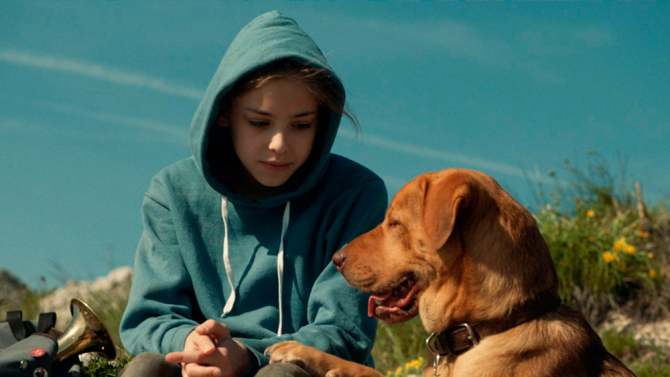Interview: 'White God' Director Kornél Mundruczó on Twisting Genre, Working with Canine Actors and Opera
 Friday, March 27, 2015 at 11:32PM
Friday, March 27, 2015 at 11:32PM Jose here. Kornél Mundruczó’s White God opens with one of the most memorable scenes in recent films, as we see a the desolate streets of Budapest in the aftermath of a canine uprising which has forced all the citizens to stay inside their homes. All except one, a little girl (Zsófia Psotta) trying to find her beloved dog, who unbeknownst to her, is actually the leader of this revolution. While the film has been compared to Rise of the Planet of the Apes, White God in fact has more in common with two 1960s classics: Spartacus and The Birds, which makes sense considering that Mundruczó has made a career out of paying homage to classic Hollywood films, while injecting them with darker political undertones.
The film was a sensation at the 2014 Cannes Film Festival, and was Hungary’s official submission for the Academy Awards; it could also very well become Mundruczó’s international breakthrough. On the eve of the film’s Stateside premiere I talked to the filmmaker about his career so far, the struggles of working under extreme circumstances and his love for opera.

JOSE: I thought the film was entertaining in a conventional thriller sense, but it was also such a powerful allegory for the rise of right-wing racism in Europe. How were you able to achieve a balance between the two?
KORNÉL MUNDRUCZÓ: It was really personal, when I started to work on this movie I was really touched by the situation of the dogs inside Budapest. I went to a dog pound, for different reasons, not as a filmmaker, and I was so touched. Sometimes something just steps on your soul, and that’s what this felt like, I felt such a shame, I was in shock, I was part of a system that was supporting this. I wanted to talk about it and I believe that democracy is talking about things, so I decided I wanted to make a movie about one dog in Budapest. When we were developing the script, it was obvious that this was also a great allegory for what is the illness of our society. But this wasn’t something premeditated, I never thought “I want to shoot a metaphor”, I just wanted to tell this story.
 Has there been a difference in how the film is received in countries like Spain and Greece which have seen powerful social uprisings in recent years?
Has there been a difference in how the film is received in countries like Spain and Greece which have seen powerful social uprisings in recent years?
Totally huge difference, I have no clue how it will be received in the US, but I feel that there are Eastern souls and Western souls, in France for example, they identified with the major society, but when people saw the movie in Mexico they felt “we are the dogs”. In Eastern Europe, we also felt we were the dogs. We have also had a lot of success in Turkey, which is very curious, since I had no connections with this country at all, but we’ve had lots of comments from there.
 Hungary,
Hungary,  Kornél Mundruczó,
Kornél Mundruczó,  White God,
White God,  dogs,
dogs,  foreign films,
foreign films,  interview,
interview,  politics
politics 

